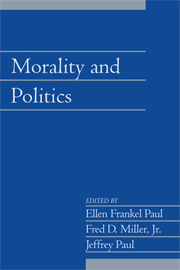Book contents
- Frontmatter
- Contents
- Introduction
- Acknowledgments
- Contributors
- What's Morality Got to Do With It? Making the Right Distinctions
- Unauthorized Humanitarian Intervention
- Thinking Constitutionally: The Problem of Deliberative Democracy
- Representing Ignorance
- Dual Citizenship and American Democracy: Patriotism, National Attachment, and National Identity
- Policy Implications of Zero Discounting: An Exploration in Politics and Morality
- Reflections on Espionage
- Mr. Pinocchio Goes to Washington: Lying in Politics
- A Subject of Distaste; An Object of Judgment
- Against Civic Schooling
- Political Morality as Convention
- Autonomy and Empathy
- God's Image and Egalitarian Politics
- Should political Liberals Be Compassionate Conservatives? Philosophical Foundations of the Faith-Based Initiative
- Index
Against Civic Schooling
Published online by Cambridge University Press: 04 August 2010
- Frontmatter
- Contents
- Introduction
- Acknowledgments
- Contributors
- What's Morality Got to Do With It? Making the Right Distinctions
- Unauthorized Humanitarian Intervention
- Thinking Constitutionally: The Problem of Deliberative Democracy
- Representing Ignorance
- Dual Citizenship and American Democracy: Patriotism, National Attachment, and National Identity
- Policy Implications of Zero Discounting: An Exploration in Politics and Morality
- Reflections on Espionage
- Mr. Pinocchio Goes to Washington: Lying in Politics
- A Subject of Distaste; An Object of Judgment
- Against Civic Schooling
- Political Morality as Convention
- Autonomy and Empathy
- God's Image and Egalitarian Politics
- Should political Liberals Be Compassionate Conservatives? Philosophical Foundations of the Faith-Based Initiative
- Index
Summary
INTRODUCTION: WHAT IS CIVIC EDUCATION?
A fierce debate about civic education in American public schools has erupted in response to the terrorist attacks of September 11, 2001. Many liberals and conservatives, though they disagree strongly about which civic virtues to teach, share the assumption that such education is an appropriate responsibility for public schools. They are wrong. Civic education aimed at civic virtue is at best ineffective; worse, it is often subversive of the moral purpose of schooling. Moreover, the attempt to impose these partisan conceptions of civic virtue on America's students violates the civic trust that underpins vibrant public schools.
Here is how the recent debate has unfolded and what we might learn from it. In response to demands from teachers about how to deal with the messy emotional, racial, religious, and political issues occasioned by the September 11 attack and its aftermath, the National Education Association (NEA) offers a Web site titled “Remember September 11.” The site is full of materials about how to counsel distressed students; how to place September 11 in some kind of historical, cultural, and international context; and what moral lessons might be drawn from the attack. These moral lessons range from “Remembering the Uniformed Heroes at the World Trade Center” to “Tolerance in Times of Trial.” Similarly, the National Council for Social Studies (NCSS) offers lesson plans for “9/11” on its Web site: these materials range from “The Bill of Rights” to “My Name is Osama,” the story of an Iraqi-American boy taunted by his peers because of his name and Muslim customs.
- Type
- Chapter
- Information
- Morality and Politics , pp. 221 - 265Publisher: Cambridge University PressPrint publication year: 2004



